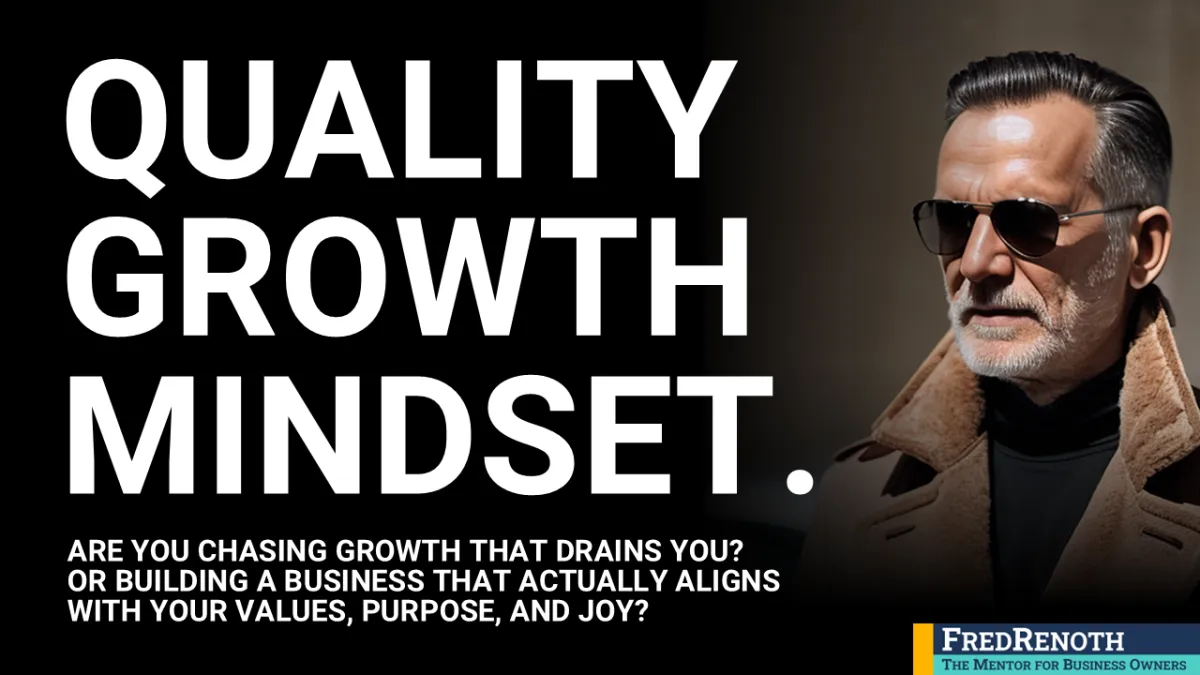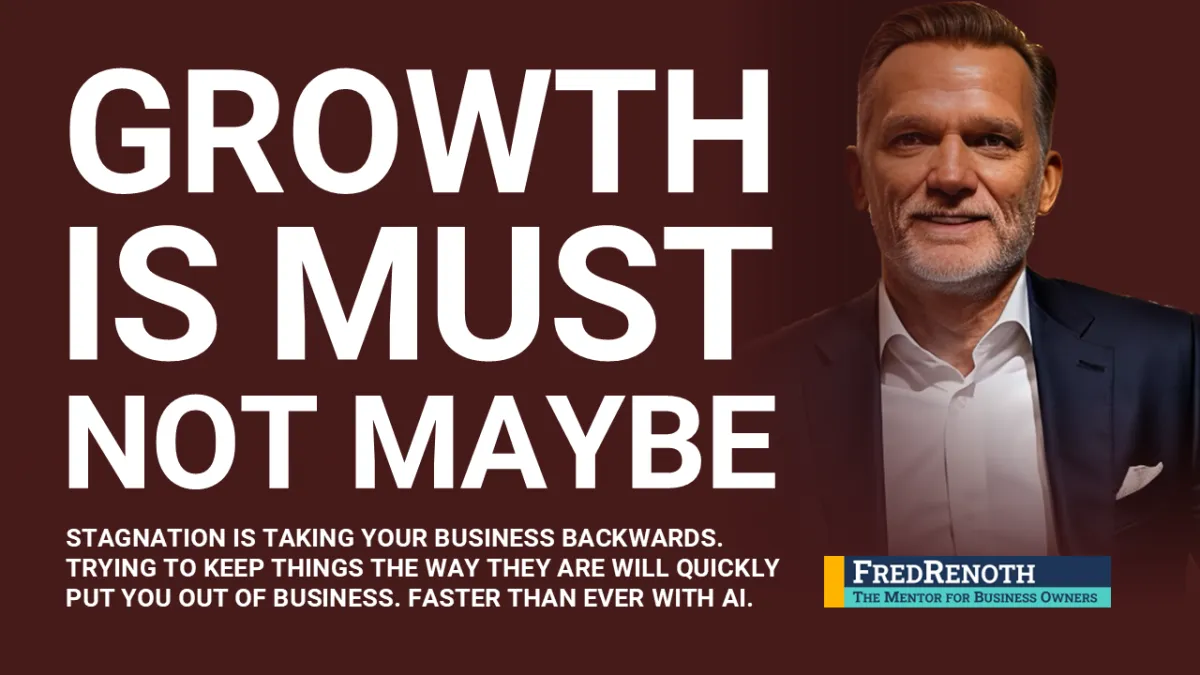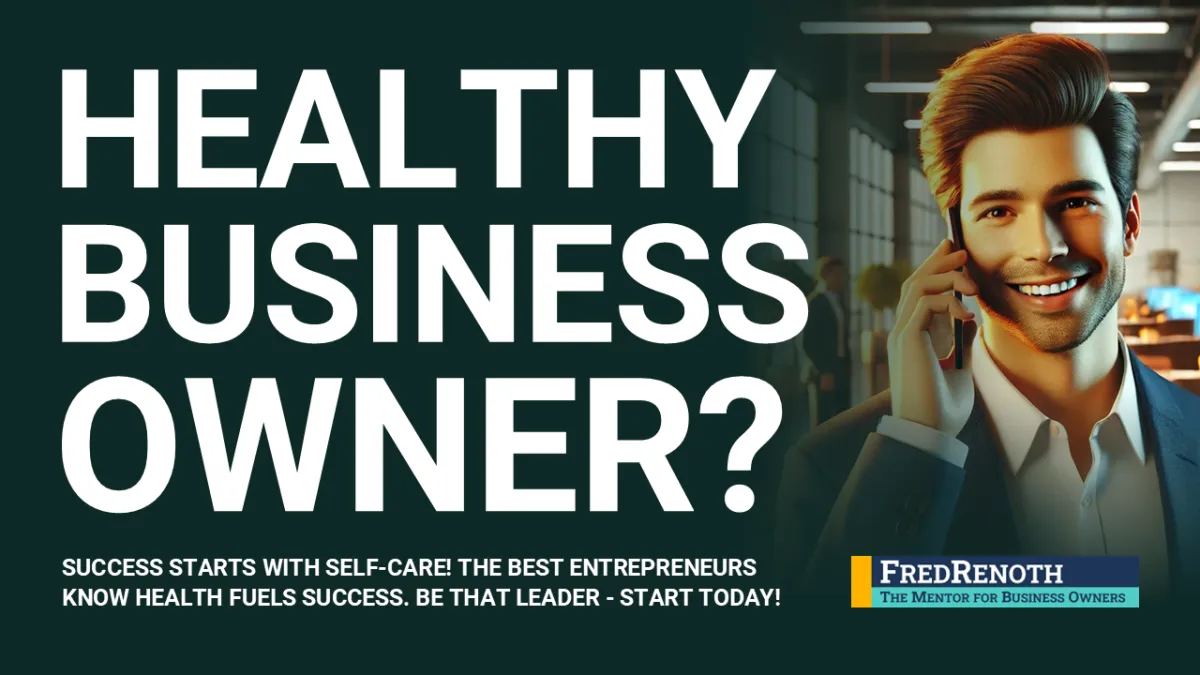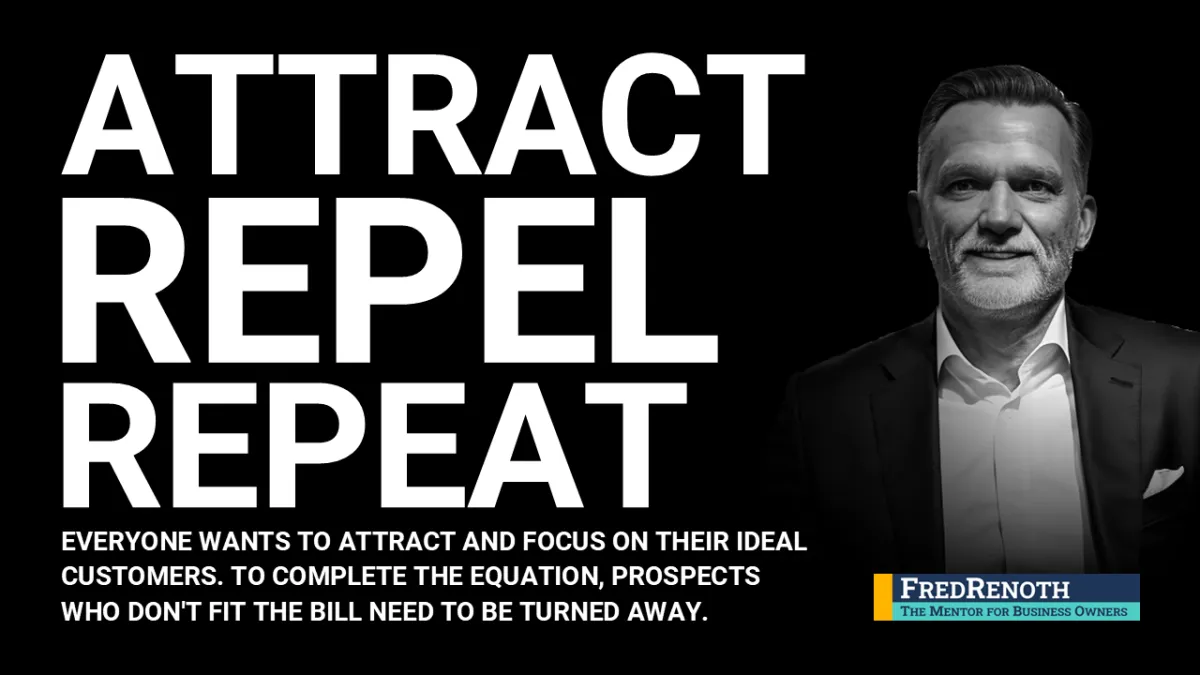


Welcome to Fred's
the Healthy Business BLOG
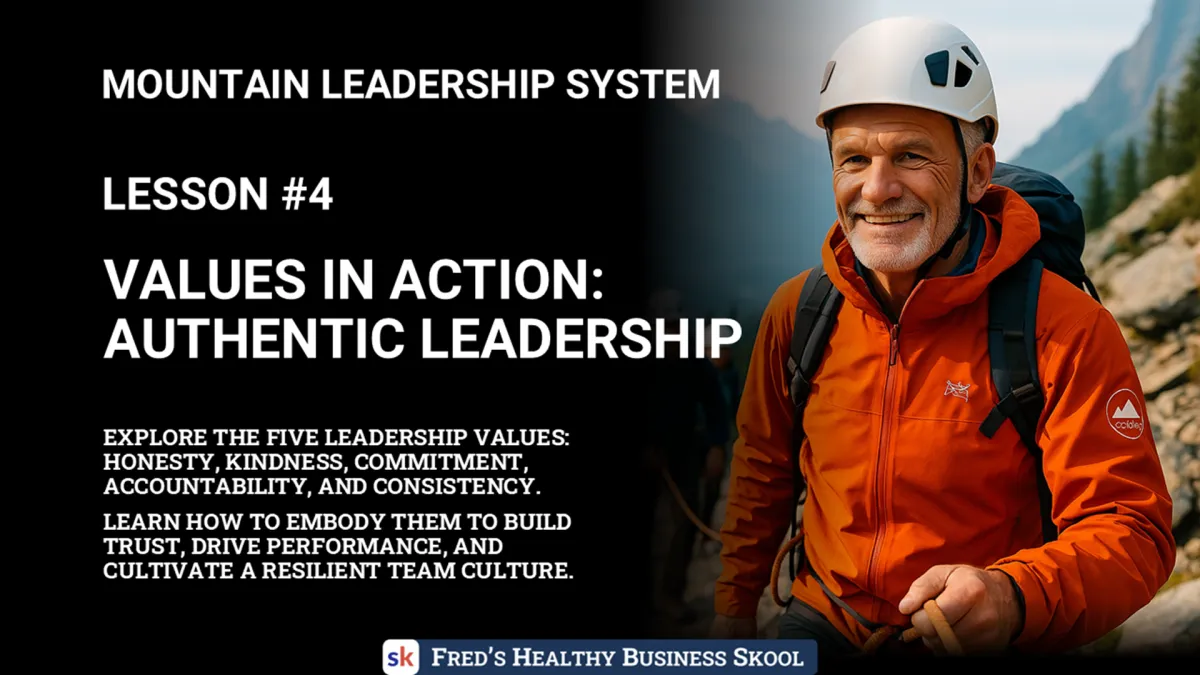
Lesson #4 - Value Based - Authentic Leadership
Every leadership book talks about values. They hang framed on office walls. They headline team retreats. They’re printed on mousepads and mugs. But if your values never make it into your voice, your calendar, and your decisions - they’re not values. They’re decoration.
This module isn’t about decorating your leadership with nice words. It’s about infusing your actions with core beliefs that guide everything you do - especially under pressure.
Because when the heat rises, people don’t follow slogans. They follow you. The real you not the polished version, but the one who shows up in conflict, stress, or change.
And here’s the truth: You lead best when your values are visible. Tangible. Lived. This is where the Mountain Leadership System takes a bold step forward.
After building your foundation in self-leadership, developing a compelling vision, and mastering the art of service-centered empowerment - this module unlocks your leadership integrity: the part that others feel, not just hear.
Because values aren’t abstract. They are decisions. They are your heartbeat.
5 Unshakable Values Turn Managers Into Trusted Leaders
Every leadership book talks about values. They hang framed on office walls. They headline team retreats. They’re printed on mousepads and mugs. But if your values never make it into your voice, your calendar, and your decisions - they’re not values. They’re decoration.
This module isn’t about decorating your leadership with nice words. It’s about infusing your actions with core beliefs that guide everything you do—especially under pressure.
Because when the heat rises, people don’t follow slogans. They follow you. The real you not the polished version, but the one who shows up in conflict, stress, or change.
And here’s the truth: You lead best when your values are visible. Tangible. Lived. This is where the Mountain Leadership System takes a bold step forward.
After building your foundation in self-leadership, developing a compelling vision, and mastering the art of service-centered empowerment - this module unlocks your leadership integrity: the part that others feel, not just hear.
Because values aren’t abstract. They are decisions. They are your heartbeat.
Start-of-Module Questionnaire: Where Do You Lead From?
Before diving in, take 10 minutes to self-assess your current relationship with each of the five leadership values. Rate each question from 1 (rarely true) to 5 (consistently true).
HONESTY
I speak the truth, even when it’s uncomfortable.
I give clear, direct feedback instead of avoiding conflict.
I lead conversations with clarity over comfort.
KINDNESS
I correct or challenge others without disrespect or shame.
I treat every team member with respect—even under stress.
I make people feel safe while holding them to high standards.
COMMITMENT
I follow through on the projects I start.
I lead with grit, especially when things get difficult.
I show up fully, regardless of how I feel that day.
ACCOUNTABILITY
I own my mistakes without blaming others.
I model ownership in front of my team.
I take responsibility even when it wasn’t technically “my fault.”
CONSISTENCY
My actions align with my values every day.
My team knows what to expect from me.
I maintain strong routines, even during chaos.
After scoring, total your points for each value. Identify your strongest and weakest areas—these will be your personal focus points over the next four weeks.
Week 1 – Honesty: Leading with Truth Over Comfort
Let’s start where every strong leader begins: with the truth. Honesty isn’t just about avoiding lies - it’s about choosing to be clear, even when it’s uncomfortable. It means being willing to say the things others won’t, especially when it really matters. We’ve all had moments when we held back. Maybe you softened your feedback to avoid hurting someone’s feelings. Maybe you steered around a tough conversation. Maybe you nodded along in agreement when, deep down, you knew you disagreed.
Chances are, you weren’t trying to deceive anyone. You were probably trying to keep the peace, protect a relationship, or just avoid a tense moment. But here’s where leadership often takes a wrong turn: when we avoid discomfort for the sake of being “nice,” we end up creating confusion instead of clarity. And that confusion doesn’t just blur communication - it quietly weakens trust.
Real leadership means being honest early and clearly. Not harshly, but with courage and respect. When you speak with clarity and care, you build trust. A Gallup study found that only 26% of employees strongly agree that the feedback they receive helps them improve. That’s because most feedback is so softened, it loses all value. In trying not to hurt feelings, many leaders end up saying nothing useful at all.
The truth is never a favor when it’s hidden. When you withhold it, you slow down growth - for others and for yourself. Worse, you make it harder for your team to trust you. Because trust doesn’t grow in silence. It grows in clarity.
Truth builds resilient teams. It creates a culture where people know where they stand. And when delivered with care, it’s one of the kindest things a leader can offer.
So this week, start paying attention. Notice the moments when you hesitate to speak your full truth. Watch how often you say “yes” when you’re unsure, or agree just to keep the peace. These small choices reveal the gaps in your leadership. And they also show you where you’re ready to grow. Ask yourself: where in my leadership do I need to speak with more truth - and less comfort? That’s where real trust begins.
Journal Prompt for Week 1:
Recall a recent situation where you didn’t tell the full truth.
What did you fear might happen?
What actually happened?
What would have changed if you had told the truth with clarity and kindness?
Weekly Challenge:
Choose one uncomfortable truth you’ve been avoiding.
Have the conversation. Speak it clearly. Make space for response.
Then write down what changed - inside you, and in the relationship.
Reflection Questions: End of Week 1 – Honesty
Where did I choose clarity over comfort this week?
What conversation was hardest to initiate—and what changed afterward?
How did speaking truth affect my confidence as a leader?
Week 2 – Kindness: Respect as a Leadership Power Tool
When most people hear the word “kindness,” they think of gentle words, warm smiles, and soft tones. Many leaders assume it means being agreeable or nice all the time. But in leadership, kindness is something much more powerful. It’s not about being soft - it’s about being strong enough to treat others with deep respect, especially when it’s not easy or convenient.
If honesty is what builds the foundation of trust, then kindness is what keeps everything running smoothly. It helps ease tension, keeps relationships healthy, and prevents burnout - not just for your team, but for you as well. The best leaders don’t need to dominate or control. Instead, they lead with a steady sense of respect. They know how to hold high standards without putting people down. They can offer tough feedback without making anyone feel small. They know how to challenge someone and still leave them feeling valued and supported.
In fact, a study from Harvard Business Review showed that leaders who consistently act with kindness and compassion build teams that perform better, stay longer, and grow stronger over time. That’s because kindness creates what psychologists call “psychological safety” - a work environment where people feel safe to speak up, take risks, and improve. And when people feel safe, they give more of their creativity, effort, and heart.
Now think about your own experience. Have you ever worked with a leader who was incredibly smart, but made you feel unimportant or ignored? You may have followed their direction - but you probably held back. Because fear doesn’t invite your best effort. It shuts it down. Kindness does the opposite. It invites people to rise.
So this week, your task is to lead with what we call “high standard kindness.” That means you still say what needs to be said, but you say it with warmth. You leave room for mistakes, but you don’t let momentum slip. You look someone in the eye and say, “I believe in you - and I need more from you.” That’s not weakness. That’s leadership at its best.
Journal Prompt for Week 2:
What’s your default tone when you’re under stress—sharp or silent?
How does that tone affect the people around you?
What would change if you spoke with strength and kindness in those moments?
Weekly Challenge:
Find one team member, peer, or partner you need to challenge.
Do it this week—with both candor and care.
Notice what changes in how they respond to your leadership.
Reflection Questions: End of Week 2 – Kindness
How did I express high standards and kindness at the same time?
What surprised me about leading with respect?
How did my team respond to my tone and presence?
Week 3 – Commitment: The Strength to Stay In
Let’s be honest - commitment often gets treated like a heroic ideal. We love the stories of people who never quit, who push through no matter what, who always finish what they start. But real-life commitment? It’s rarely exciting. Most of the time, it feels repetitive, tiring, and inconvenient. And when you're leading, those hard moments show up more often than you'd like.
Leadership doesn’t come with a smooth road. You’ll face misunderstandings, criticism, and resistance. And in those moments, your team won’t be judging you by your motivational speeches. They’ll be watching what you actually do. They’ll notice if you show up when it’s tough, if you follow through when no one is checking, and if you still care when the initial energy fades.
That’s the real heart of commitment. It’s not about being emotionally fired up. It’s about choosing to stay the course - especially when you don’t feel like it.
In fact, McKinsey research found that teams led by leaders who consistently follow through on their commitments experience 40% higher engagement and trust. Why? Because when your team sees you follow through, they start to believe they’re safe. They know you’re steady. And that kind of dependability creates a foundation for growth and high performance.
This week, you’ll take a closer look at your own patterns. Where do you show up strong at the start but lose momentum before the finish line? Where do you make promises that never quite become action? And the deeper question is this: What are those moments teaching your team about what they can expect from you?
Your leadership isn’t defined by what you start. It’s defined by what you carry through to the end.
Journal Prompt for Week 3:
Write about a moment when you almost gave up—but stayed in.
What helped you push through?
What kind of leader did you become in that moment?
Weekly Challenge:
Pick one task, project, or promise you’ve been avoiding.
Complete it this week—no matter what.
Notice how you feel once it’s done.
Reflection Questions: End of Week 3 – Commitment
What task did I complete that I had been avoiding?
Where did I feel the temptation to quit—and what helped me stay in?
What did I learn about my own stamina this week?
Week 4 – Accountability: Radical Ownership in Action
There’s one phrase that quietly destroys leadership faster than almost anything else: “That’s not my fault.” It’s tempting, isn’t it? Blame is easy. It protects our ego and gives us something to point at. But while blaming others might feel good in the moment, it does nothing to move things forward. Progress only starts when someone is willing to take responsibility - and in leadership, that someone has to be you.
Accountability isn’t about shifting blame or finding the right scapegoat. It’s about having the courage to look in the mirror first. Great leaders don’t just take credit when things go well. They also own the messes, the missteps, and the moments that feel unfair. And they do it not just when it’s convenient—but especially when it’s hard.
Jocko Willink, a former Navy SEAL and author of Extreme Ownership, said it plainly: “Leaders must own everything in their world. There is no one else to blame.” That level of ownership doesn’t just fix problems - it reshapes culture. It shows your team that if something goes wrong, you’re not going to run or hide. You’ll step up, face it, and make it better. And when they see that, they’re more likely to do the same.
This week, you’re invited to step into that kind of power. Think about moments where you deflected blame—even subtly. Look at where you felt the tension but avoided owning your part. Then name it. Claim it. And take the next right step.
Because accountability isn’t about punishment or guilt. It’s about growth. It’s about leading in a way that gives others permission to be brave. And when that happens, your team doesn’t just get better—they become unstoppable.
Journal Prompt for Week 4:
What’s one mistake you made recently that you’ve been rationalizing or minimizing?
What would full ownership look like?
What would it feel like to repair it?
Weekly Challenge:
Publicly own a mistake this week.
To your team, your client, your peers—whoever it impacted.
Then outline what you’re doing to fix it.
Watch what happens to your credibility.
Reflection Questions: End of Week 4 – Accountability
What mistake or misstep did I own this week?
What was the impact of taking full responsibility?
How did this change how others see me—and how I see myself?
Bonus Section – Consistency: Trust Built One Day at a Time
Consistency is the leadership value that rarely gets the spotlight. It’s not flashy. It doesn’t show up in inspirational quotes or leadership bestsellers. But it’s the value your team notices the most - because they feel it every single day.
Consistency is the steady rhythm behind everything you do as a leader. It’s not about how you show up in a crisis or how passionately you deliver a keynote. It’s about what you do when no one’s watching. It’s about the small, repetitive actions that prove your values are more than just words. If you say your people matter, do they see that in your behavior week after week? If you say learning is important, are you still making time to grow when your calendar is full? If health matters to you, are you actually taking the time to rest and recharge - or are your values the first thing to go when pressure rises?
That’s the real test. Because values that only show up when it’s convenient aren’t really values—they’re preferences. What builds trust isn’t intensity. It’s reliability.
Research from the Leadership Circle confirms this: consistent leadership is one of the most powerful predictors of high-performing teams. It’s not about having the loudest voice or the longest résumé. What matters most is that your team can count on you to be the same person today, tomorrow, and next week. When your actions line up with your words over time, you become someone they can truly follow.
This week, you’re not here to judge yourself. You’re here to observe. Look at your daily rhythms. Pay attention to where your actions drift from your stated values. Then realign - not with pressure, but with intention. Because the more predictable and steady your leadership becomes, the more your team will trust it. And when they trust you, they’ll go wherever you’re leading - confidently, and all the way.
Journal Prompt for Consistency:
Where are your actions out of sync with your stated values?
What’s one small change that could bring them closer?
Weekly Challenge:
Pick one value you want to embody more consistently.
Design a tiny daily habit that supports it—and stick to it for 7 days.
Then write down what you learned.
Final Action Plan: 5 Commitments to Live Your Leadership Values
At the end of this module, choose one small action in each category that you will continue for the next 30 days. These will become the visible markers of your values in action.
1. Honesty: What truth will I speak more often or more clearly—starting now?
2. Kindness: What behavior or habit will I use to make others feel respected—especially during tension?
3. Commitment: What recurring task or routine will I complete no matter what?
4. Accountability: Where will I own results more visibly and proactively?
5. Consistency: What daily habit will reinforce who I say I am?
At the end of 30 days, review these. Adjust if needed. Keep going.
Conclusion: When Values Move, People Follow
You’re not just here to build a business - you’re building something much deeper. You’re building a culture. And that culture doesn’t start with your logo, your mission statement, or your strategy deck. It starts with you.
It starts with how you act when no one’s paying attention. With the things you say when conversations get tough. With how you carry yourself when plans fall apart or pressure builds. That’s when real leadership shows up—not in the easy moments, but in the ones that test your character.
This is where trust is truly earned. Not through perfection, but through presence. Through showing up, again and again, with integrity and care. This is where the Mountain Leadership System comes alive not as a theory, but as a heartbeat. Something steady. Something your team can feel.
Because people don’t follow perfect leaders. They follow leaders who are real. Who are honest when it’s hard. Who lead with kindness, stick with their commitments, take responsibility, and show up with consistency.
In short, people follow leaders who live their values - not just talk about them. That’s what this journey is about. That’s what makes your leadership matter.
And now, it’s your move.
Share your insights and benefit from the HBS community!
Don’t go it alone. Join the conversation in the HBS Community at Fred's Healthy Business School. Share your insights, questions, and real-life lessons. We grow stronger when we grow together.
Want to Take it a Step Further?
Enjoyed this article?
It may give you a taste of what we talk about with our clients in the FredRenoth Mentoring Program.
Check out our website (CLICK HERE FOR WEBSITE).
And, of course, I'm ready to answer all your questions in a VALUE CALL. Just click the link.
Copyright 2025 Sysbizz LLC - All Rights Reserved



